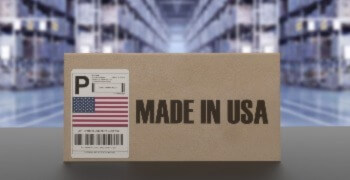
New online delivery fee in New York City would be ‘negligible’
Everything comes at a cost, especially in The Big Apple. New York City imposes a fee on taxi trips and a transportation surcharge on congestion; it taxes services that are exempt from New York state sales tax; and if Senate Bill S5895 becomes law, starting January 1, 2024, it will add a surcharge to online sales delivered into the city.
States have a tendency to watch and emulate one another with respect to tax policy: When one state decides to exempt diapers and/or feminine hygiene products, other states consider doing the same. Likewise, when one state comes up with a new way to generate tax revenue, other states often try it too. This seems to be what’s happening with fees on retail deliveries.
On July 1, 2022, Colorado became the first state to levy a retail delivery fee. Minnesota introduced a similar retail delivery fee six months later. And now New York — both New York City and New York state.
A 25-cent surcharge on online delivery sales into New York City
Senate Bill S5895 seeks to impose a 25-cent surcharge on every online delivery sale within the city of New York. The bill was introduced by Senator Andrew Gounardes from New York Senate District 26, which is in New York City.
The measure presents the following justification for the online delivery surcharge:
- New York City is expected to have 9 million residents by 2040
- Many New Yorkers “rely on quick and easy access to consumer goods in their daily lives”
- Close to 90% of goods are moved into and out of the city by truck
- Heavy-duty diesel vehicles are responsible for roughly half of on-pipe tailpipe emissions
- Over 2.3 million packages are delivered to New Yorkers every day, fueled in part by “the spike in 24-hour deliveries” promised by many online retailers
- Last-mile warehouses are much larger than traditional warehouses and attract a significantly higher volume of large, heavy trucks
All these deliveries are taking a toll on the city, according to the bill’s justification. The New York City Department of Transportation wants to shift freight from roads to rail, water, and other modes of transportation, but to do that, it must first improve its infrastructure. And that will cost. The 25-cent online delivery fee would help fund a variety of New York City infrastructure projects, including the rehabilitation of ferry docks, marine terminals, piers, and more.
It seems an elegant solution, at least in concept: Online sales can fund solutions to problems caused, in part, by the spike in online sales. And 25 cents shouldn’t break most banks. Indeed, the last paragraph of the bill’s justification calls the 25-cent surcharge on online delivery packages “negligible.”
But for sellers, there’s more to the New York City online delivery sales surcharge than a simple quarter. If SB S5895 becomes law, online sellers will have to figure out how to invoice the fee, collect the fee, and pass it on to consumers. Not rocket science, perhaps, but not simple.
If there were any doubt that handling a simple fee could be complicated, just look at Colorado. Collecting, remitting, and reporting the Colorado retail delivery fee is anything but negligible for affected businesses.
Lessons from the Colorado retail delivery fee
The 27-cent Colorado retail delivery fee — which will jump to 28 cents on July 1, 2023 — also has to be collected by the retailer from the consumer. The retailer isn’t allowed to absorb the fee (aka, pay it on behalf of the consumer). Yet for many retailers, paying the fee on behalf of all customers would be more cost-efficient than fulfilling their obligation to collect the fee.
The Colorado retail delivery fee doesn’t fit neatly into some invoicing systems. Furthermore, the ecommerce platforms used by many retailers are unable to accommodate the fee. Businesses striving to comply with the fee’s invoicing, collection, and reporting requirements are finding they have to use different software systems for different tasks. It’s costly for businesses and can end up being a hassle for their customers if the business has to reach out to collect a 27-cent fee separately.
Just imagine that experience, from a customer’s perspective: You’ve just paid hundreds or thousands of dollars to a company and then they contact you to ask for 27 cents.
Businesses have spoken up about these and other pain points, and some Colorado lawmakers have listened. The Colorado General Assembly is considering a measure that would simplify retail delivery fee compliance by exempting certain small businesses from the retail delivery fee altogether, allowing businesses to pay the fee themselves, and more.
“The administrative complexity retailers face with the Colorado retail delivery fee is forcing that state’s policymakers to reconsider the fee’s structure,” notes Scott Peterson, VP of Government Relations at Avalara. “Other states should take those experiences into account as they debate similar fees.”
Nonetheless, similar retail delivery fees are sprouting up around the country. Ok, not like the fungus in “The Last of Us,” but not a negligible amount. There’s even a statewide fee on delivery transactions in the New York budget bill for 2023–24.
25-cent fee on delivery transactions in New York state
New York Assembly Bill 3009 includes a fee on “delivery transactions terminating within the state.” Unlike the fee proposed for New York City, the 25-cent statewide fee would apply to transactions that result in the delivery of personal tangible property from a retail sale, “whether purchased online or not, to the purchaser within the state.” In this respect, it’s more like the Colorado retail delivery fee.
Should both AB 3009 and SB S5895 be enacted, residents of The Big Apple will have to pay 50 cents on online deliveries into the city and 25 cents on other deliveries of tangible goods.
However, the fact that the New York City fee targets online sales only could prove problematic. “We need to wonder if the legislation will be challenged for violating the Internet Tax Freedom Act (ITFA), which prohibits discriminatory taxes on electronic commerce, and the state and federal equal protection clauses,” says Peterson. That’s unlikely to come up for the statewide fee, which would apply to all deliveries into the state, including those stemming from in-person, mail, or phone transactions.
Avalara AvaTax can handle the first-of-its-kind retail delivery fee in Colorado. Contact us to learn more.
Update August 2023: New York did not enact a retail delivery fee during the 2023 legislative session.

Avalara Tax Changes 2026 is here
The 10th edition of our annual report engagingly breaks down key policies related to sales tax, tariffs, and VAT.
Stay up to date
Sign up for our free newsletter and stay up to date with the latest tax news.















